| Back One Page | Home | Forward One Page |
| Irish Labels, Stamps & First Day covers | |||
| Celtic Cross Label | |||
|
Ringed cross with shamrock leaves; in the four "corners" and
inscriptions of "Éire" and "Sinn Féin" (twice) on cross
Printed by James Walker & Co. Ltd., Dublin. in 1908, and again in 1916.The difference between the two years being only colour |
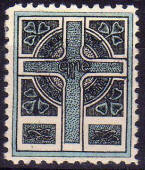 |
||
| Hibernia and Wolfhound Label | |||
| Hibernia (Erin) with harp, with arms of the four provinces of Ireland (at corners) and wolfhound; inscriptions "Éire" (top panel) and "Sinn Féin" (left and right panels). There is some confusion over the identification of the arms of the provinces on the Hibernia label. Connaught (conjoined eagle and arm, upper right), Munster (triple crowns, lower right), and Ulster (hand, lower left) are all clear, but what logically should be the harp of Leinster at upper left has been replaced by a single crown of indeterminate significance. The crown has been interpreted as an obscure symbol for Leinster, and as the arms of the old province of Meath | |||
| Printed by James Walker & Co. Ltd., Dublin. in 1908, and again in 1916. The 1916 version was re-drawn and thus differs from the 1908 version |
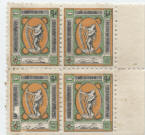 |
||
| 1916 Manchester Martyrs Label | |||
| Printed in April or May 1916 this label commemorates the 3 Fenians, William Allen, Michael Larkin, and William O'Brien, hung in Manchester following the death of a police constable escorting two prisoners whom the Fenians were trying to free. |
 |
||
| Erie Puist Label | |||
 |
Patrick Pearse, Thomas MacDonough, James Connolly] The O'Rahilly, Eamonn de Valera, Cornelius Colbert, and Eamonn Ceannt; the label in the bottom right-hand corner of the sheet depicts a harp | ||
| It is not known who printed the sheets, nor is there evidence that they were ever sold. Some commentators have interpreted the misspelling of the Irish Gaelic Éire ("Éire Puist" is "Ireland Post") as an indication that the labels were printed in America, by Republican sympathizers. It is also argued for an American origin, with suggestion that "ERIE" may not be a misspelling but rather a reference to Fort Erie, captured by the Irish-American Fenians fifty years before in their attempted invasion of Canada. The initials "I. R." presumably stand for "Irish Republic." | |||
| An Port Poblact na hÉireann 1922 | |||
 |
 |
||
| Printed in Cork in 1922 by the republican (anti-treaty Forces).during the Civil War. It was probably an attempt to start the establishment of an alternative postage service in the Southern counties (the Republican stronghold) in opposition to the pro treaty provisional government |
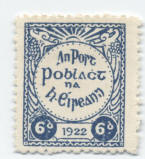 |
||
| The 1922 Overprints | |||
| On 1 February 1922 J. J. Walsh, the newly appointed Postmaster- General of the Provisional Government, published a notice in the press calling for designs for a definitive series of postage stamps for the new Irish Free State. Because of the time involved in designing and printing such an issue, and anxious that stamps representing the new government should be made available as soon as possible, Walsh decided upon the stopgap measure of overprinting the British stamps then in use in Ireland with the name of the Provisional Government. To this the British postal authorities were agreeable (indeed, full and actual control of the Post Office would not pass from the British to the Irish authorities until the end of the fiscal year on 31 March). Following the submission of proofs, two separate Dublin printing firms - Dollard Printing House Ltd. and Messrs. Alexander Thom & Co. Ltd - were contracted to do the overprinting. A six-week supply of the Great Britain issue of 1912-13, in fifteen values, was received in Dublin on 10 February, and overprinting began the same day. One week later, on 17 February, Ireland's first official postage stamps were made available to the public. Shortly after the overprints appeared, Winston Churchill, then Secretary of State for the Colonies, was questioned in Parliament "whether the King's head on British stamps . . . had been defaced by being printed over by the Irish Provisional Government . . . ." Churchill responded that ". . . it is the usual practice in a period of transition to overprint postage stamps, and the present arrangement has been agreed to by His Majesty's Government . . . ." | |||
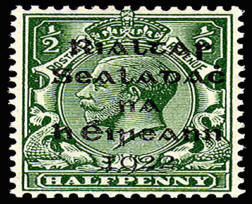 |
Rialtas Sealadac na héireann
1922" (Provisional Government of Ireland 1922) Overprint in 5 lines of text |
||
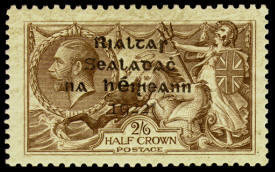 |
Rialtas Sealadac na héireann
1922" (Provisional Government of Ireland 1922) Overprint in 4 lines of text |
||
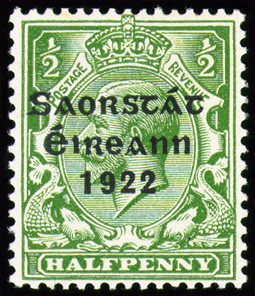 |
Saorstát Éireann 1922 (Irish Free State 1922), overprint in three lines of text |
||
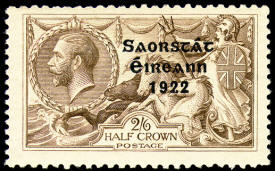 |
Saorstát Éireann 1922 (Irish Free State 1922), overprint in three lines of text |
||
 |
First Day Cover Centenary of the Birth of James Connolly 1968, with 6p and 1/- stamps | ||
 |
|||
 |
First Day Cover Centenary of her birth, Countess Markievicz 1968 with 3p and 1/5 stamps | ||
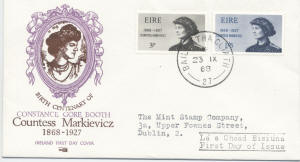 |
|||
 |
First Day Cover of 50th anniversary of the death of Terence MacSwiney & Thomas MacCurtain 1970 with 2/9 and 9p stamp sets | ||
 |
First Day Cover of the anniversary of the death of Kevin Barry 1970 with 6p and 1/- stamps | ||
| 1922 IRA Propaganda label | Block of 4 1907 - 1916 Sinn Fein propaganda labels | ||
 |
1912 - 1914 ant home rule propaganda label, "Patriots Maintain The Union" |
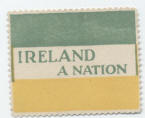 |
Propaganda Label "Ireland a nation" |
 |
1914 Home Rule Harp Political label "Ireland Demands Home Rule" |
 |
1941 Easter Rising Commemorative stamp |
 |
1941 Easter Rising Commemorative stamp | Sinn Fein Label | |
 |
Tom Clark the first signatory of the proclamation | ||
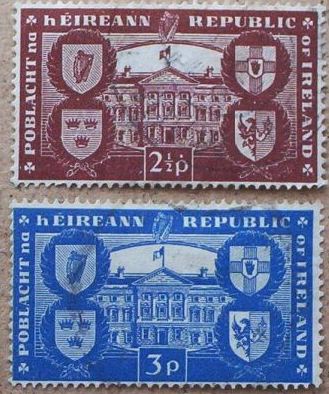 |
Proclamation of the Republic 1949 | ||
 |
The 19666 set for the 50th anniversary of the rising featuring the seven signatories of the proclamation. | ||
| Back One Page | Home | Forward One Page |
